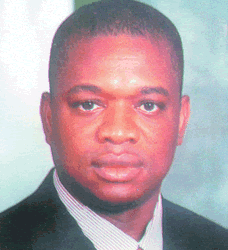


Posted by By YINKA FABOWALE on



Abia State Governor, Orji Uzor Kalu, leads the pack of a list of five Nigerians pencilled down by the United States as likely successor to President Olusegun Obasanjo in 2007.
Abia State Governor, Orji Uzor Kalu, leads the pack of a list of five Nigerians pencilled down by the United States as likely successor to President Olusegun Obasanjo in 2007.
The five, who also include a retired military officer from the
Middle Belt, an outspoken former Speaker of the House of Representatives and a serving Minister, who sometime ago accused senators of corruption, are said to have been investigated and cleared by the American authorities, according to a report in the Daily Independent edition of Wednesday.
The report quoted officials of the State Department as basing their engagement in the search for Nigeria's new leader on the excuse by campaigners of extension of Obasanjo's tenure of alleged lack of credible alternative to his leadership.
"This is our humble contribution to the search for the next leaders of a vital ally like Nigeria," the officials reportedly explained, dismissing claims that they may be meddling in a purely domestic matter of another nation.
"We are currently in consultation with the Nigerian government on other ways we can assist in ensuring a scheduled transfer of power next year. We have co-operated in the war against graft and other matters, so we have a stake in who can continue the present trend.
Kalu, the report noted, is highly favoured as the US officials believe he already has structures on the ground, is actively campaigning for the job, and enjoys extensive support base.
They, however, caution that his running battle with the President over the affairs of state may have singled him out for special attention from Obasanjo's supporters.
The officials further said: "Our sources indicate that there may be serious troubles for the governor in the coming months as he is currently under security watch by government agents."
The latest overture by Washington attests to the fact that America is not backing down from its stand against moves to prolong Obasanjo's term.
Its officials have said that they were watching events in the country closely and would continue to do so until the President quits office.
This has drawn sharp reactions from Abuja, with presidential spokesman, Femi Fani-Kayode asking Washington not to dabble into the internal affairs of the country.
President Obasanjo was also said to have asked President George Bush to caution his officials from making comments on the Nigerian situation.
But an administration official insisted that all the comments reflected the policy of the US to a new leadership in Africa as a way of ensuring "democracy and progress."
. The Assistant Secretary of State for Africa at the U.S. State Department, Dr. Jendayi Frazer and one of her predecessors, Herman Cohen, have said any plot to extend Obasanjo's mandate will negate the principles upon which the U.S. is founded.
According to Frazer, at a recent press briefing in Washington DC, the U.S. believes that presidential term limits are "extremely important."
Active in the international advocacy against the third term bid is Cohen, who is respected for the pro-African stance both in the U.S. and across the globe.
At her recent press briefing, Frazer said although Obasanjo had not declared interest in the rumoured third term, "our view is very clear that term limits should be respected."
She declared: "It is extremely important in Africa to respect term limits because it allows for the grooming of new leadership."
Arguing that relinquishing power at the due date "supports the rule of law," she noted that most of the African countries that had taken the path lacked development "under those 20 - or 30-year presidents."
Frazer noted that having a regular turnover of power "actually ingrains, it institutionalises, a democratic process and it gives an opportunity."
She warned that the alternative to such regular transfer of power is dangerous. Her words: "What happens is when people feel that they can't get into government because they're going to have a life president, what do they do? They pick up arms. They go to the bush, you know, or it opens up the space for a military coup d'etat."
Frazer's declaration is the most direct and lucid indication that the U.S. would not support the speculated plan to have the president's tenure extended. And Cohen's comment, following soon after, is believed to represent a definite move in the U.S. government circles to add to the groundswell of opposition to the rumoured third term bid.
According to Cohen, a former Assistant Secretary of State for African Affairs, "even our own country, the United States, set a limit of two terms, or eight years, for the presidency after FDR (Franklin D. Roosevelt) won his fourth presidential election in 1944."
Cohen, who spoke in an interview with a U.S. government news outlet, Washington File, recently, is well known to President Obasanjo as they had both been involved in international collaboration including at the Transparency International (TI).
Cohen said that in emerging regions like Africa, term limits are especially important, as "they help consolidate democracy."

